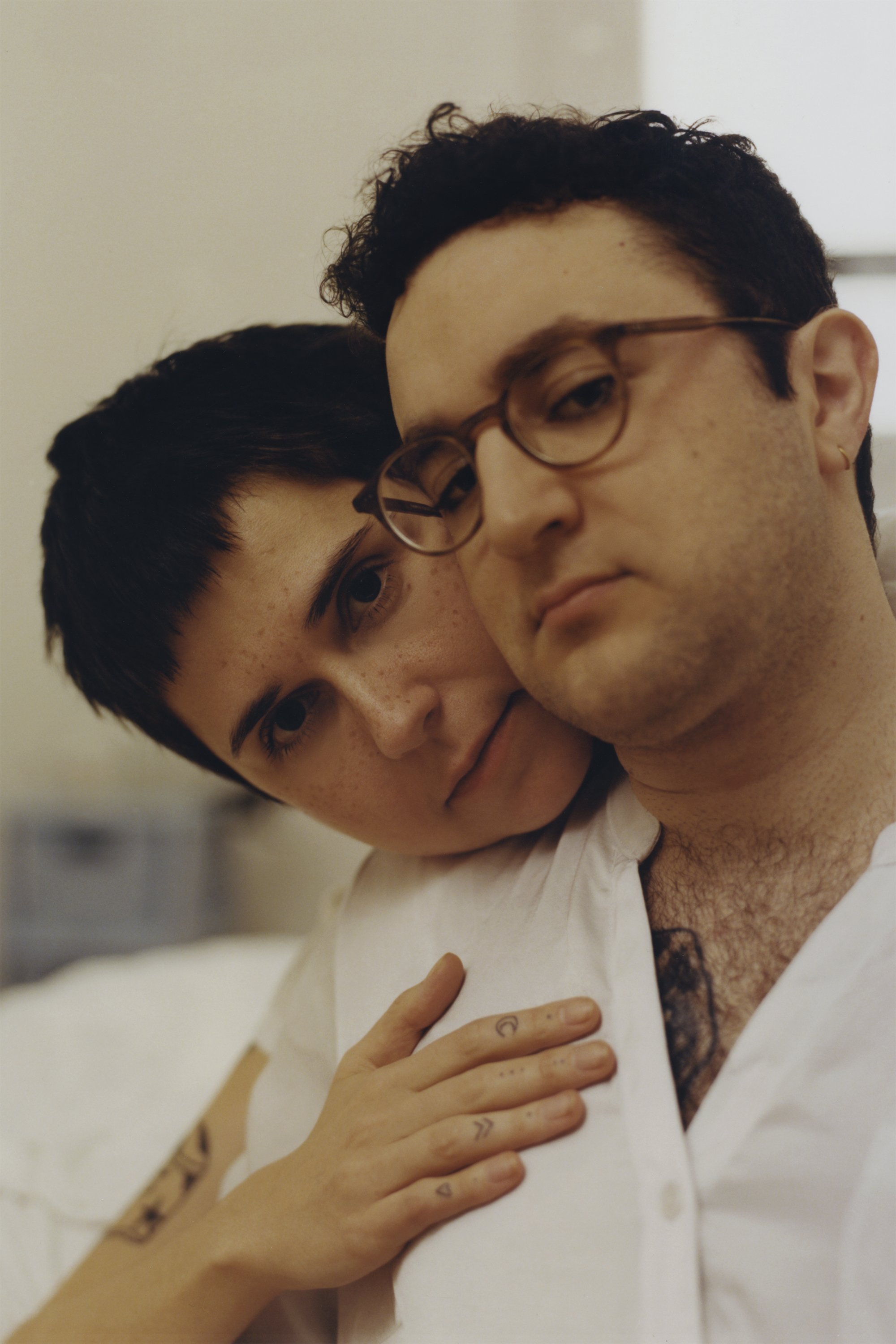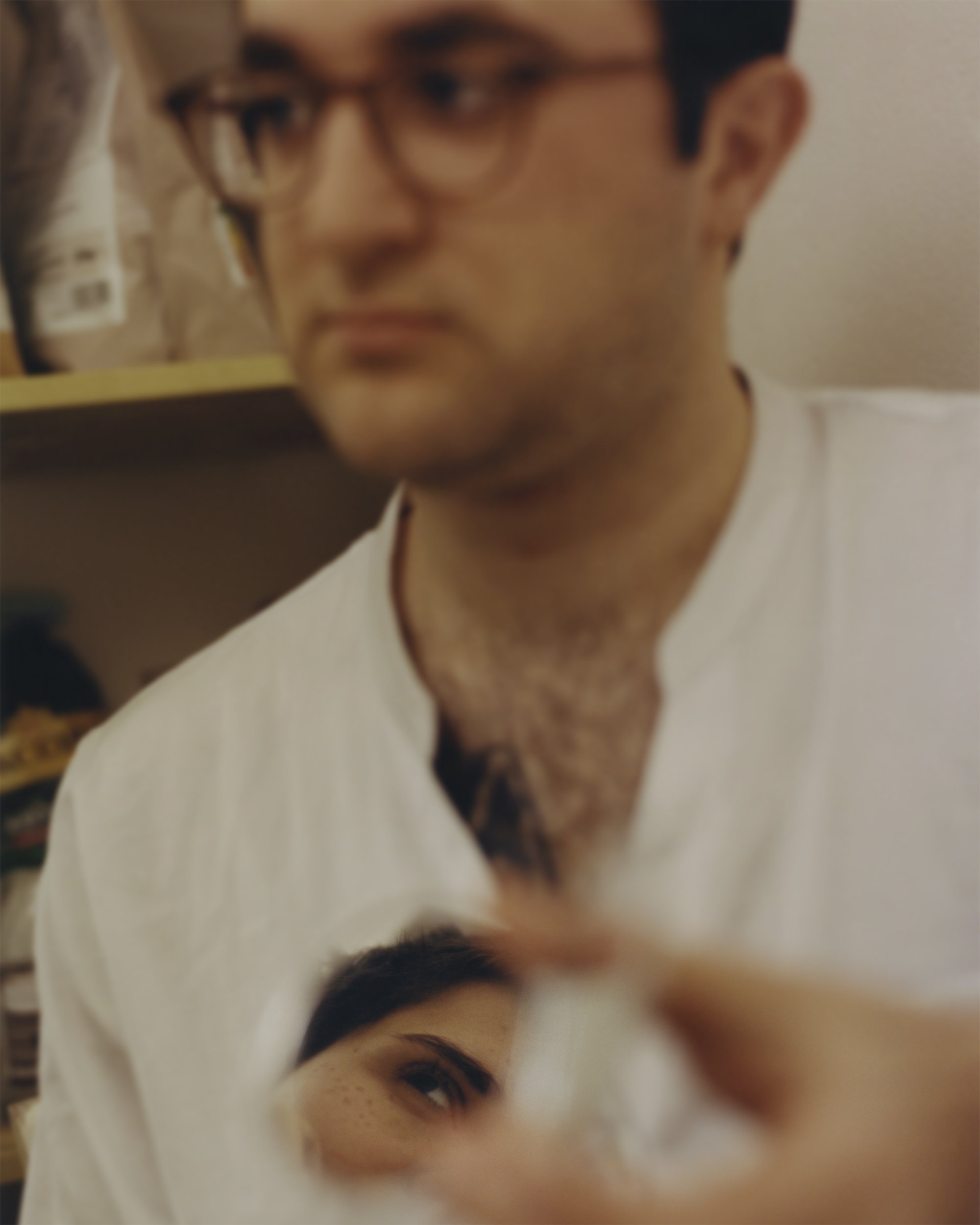Marc and Max photographed by Eden Jetschmann.
Love In Transition
As part of our digital edition exploring the theme of love, we’re honoured to introduce you to two couples who spoke to us about their relationships as they both transition. In these open and honest conversations, they share how they support each other, how their relationships have developed and when they feel most loved.
Photography by Eden Jetschmann
Max (they/them/he/him), 33 and Marc (they/them), 30.
Max and Marc met in Berlin and have been together for seven months. Max is the co-founder of uns*, an LGBTQIA+ talent agency in Berlin and Marc is a researcher.
What does love look like and feel like for you?
Max: Love for me revolves around being seen and being loved for who I am instead of being pushed into a box that society created for me. Whenever I experience a gender euphoric moment with Marc, it’s because they see me for who I truly am. This feels like pure love to me.
Marc: Love is being accepted and cared for. Wanting to do better and be better for yourself and your partner. It’s being part of a team.
Has your idea of love changed since meeting each other?
Max: I discovered how beautiful it can be to completely trust the other person, especially in moments when I am vulnerable and need support. I have been slowly learning this since I came out, but I feel like I’ve only been able to fully embrace this now. I used to embody ideas around “being complete and independent” before I allowed myself to accept love from someone, which turned out to be quite a toxic idea. It is great to finally be able to experience support and care as part of a relationship.
Marc: I think love feels more stable to me than I had experienced before.
How have you supported each other throughout your individual journey’s?
Max: The best way to support each other in my opinion is to hold space for your partner. Transitioning and being trans or gender non-conforming (gnc) comes with many hurdles, as the discrimination on an individual and institutional level can be quite intense.
None of us can take this pain away, or erase all of the issues that we are facing every day, but there is a possibility to allow sadness, offering comfort and maybe sometimes laughter – or reminding the other person of the joy we’re able to experience.
Marc: We can't always fix each other’s problems but can we can always be there to hold space, to listen, to share disappointments and victories
What have been some of the challenges?
Max: Besides the discrimination that we are facing as individuals, I find it very disturbing to be confronted with people’s expectations of what a relationship between two gnc people is. I feel that a lot of people don’t understand what gnc identities actually are, and tend to classify the relationship according to their assumptions.
I suddenly find myself in a situation where someone is comparing my queer relationship to a cis-het relationship, and they get frustrated that we are not acting in the way that is (apparently) expected from us. That ignorance is very challenging, even if it is mainly micro aggressions in our case.
Marc: Trying not to internalize toxic societal perceptions.
What has your relationship taught you about yourself?
Max: This might sound weird now, but hear me out – our relationship has taught me that I am not perfect and that this is perfectly fine. In the past, I used to have quite high expectations, I was quite harsh on myself when I “failed”. Since I met Marc, I started acknowledging these imperfections more, but also embracing them and taking them as a chance to grow (together) instead of seeing them as a flaw.
Marc: We come first.
What are some of the misconceptions around non-binary/trans relationships that you wish would stop?
Max: It is difficult to give an answer that is valid for every trans relationship, as trans people are very diverse, and so are their needs and wishes. A Black trans person, who is experiencing racism in addition to transmisia, would probably give you a very different answer.
However, I think that one of the big misconceptions is that a lot of people can’t even imagine a trans person being a loving and caring human, we tend to get characterised as detached from our sexuality and lonely. The way that trans people and relationships are shown in mass media, is very wrong and de-humanising.
But we do love, we cry because we are heartbroken, and then we fall in love again, we have sex and we experience joy, we are parents, and we dream of buying a house with the love of our lives, and some of us don’t want any of this at all, and that is also perfectly fine.
You have come against barriers to medical transition due to a variety of factors. Are you comfortable talking about some of these issues and how you’ve dealt with them logistically and emotionally?
Max: I live in Germany, so my transition is linked to the German law and regulations. As a non-binary person, it is very difficult to get the right health care. For example, if I want to have top surgery that is covered by my insurance, my insurance has to get paperwork from psychologist who works on my case.
Most of the time, non-binary people don’t get their top surgeries paid by the insurance, as it is classed as “not necessary”. I have the option to pay it myself but the surgery is very expensive and not everyone can afford to pay (at least I can’t). In the end, transitioning on a legal level means to lay down your complete history in front of strangers, who in the end will let you know if you are trans enough and therefore “deserving enough” to get the treatment you need. It’s pretty messed up.
When do you feel loved?
Max: When I am vulnerable and being looked after. When we share joy. When we take the time to discuss things through and grow together. When we talk about future plans.
Marc: When I feel seen.





